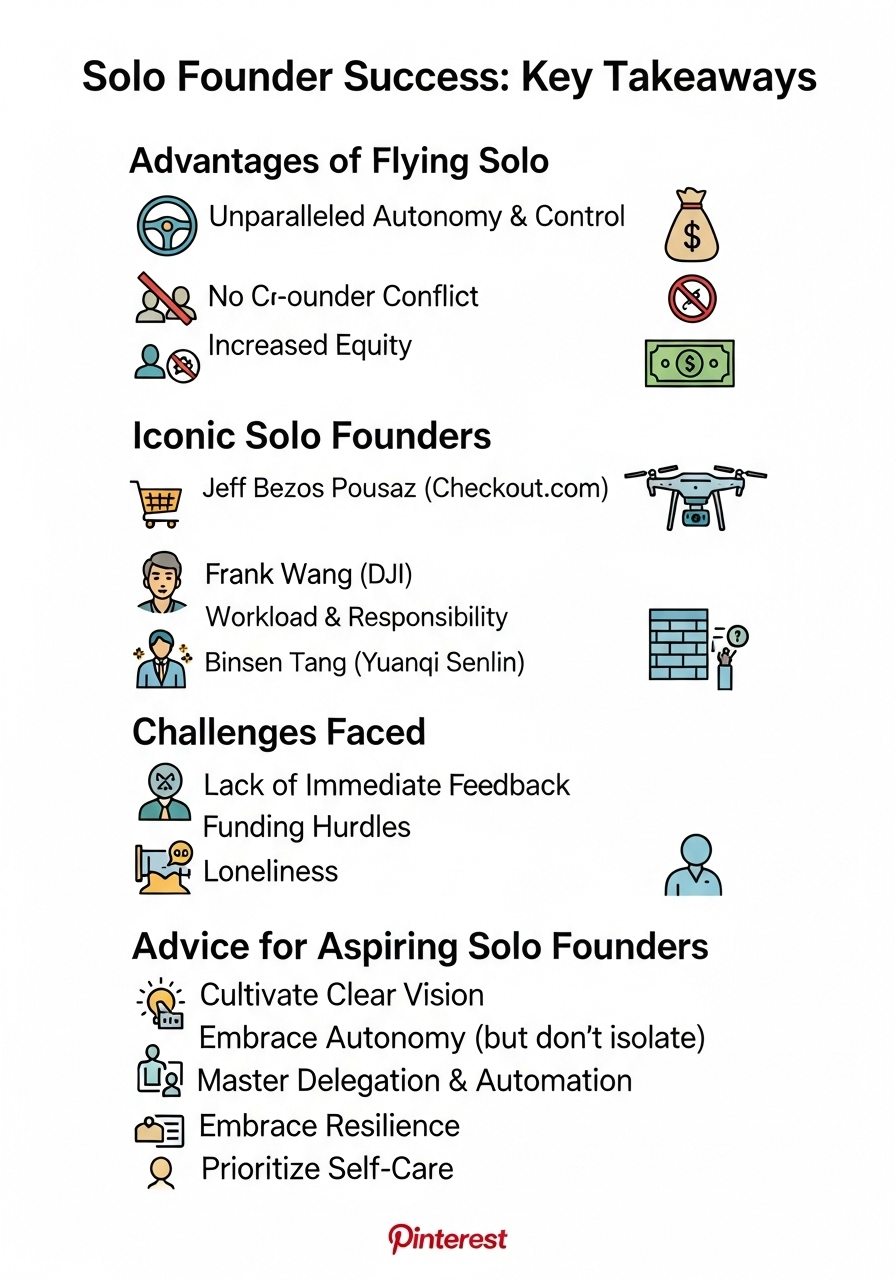
In the bustling world of startups, the narrative often centers on co-founder teams.
We hear tales of synergy and shared burdens.
But what about the lone wolves?
The visionary individuals who embark on the entrepreneurial journey by themselves,
transforming an idea into a thriving business with nothing but their own grit and determination?
These are the solo founders, and their success stories are a testament to individual vision and relentless execution.
Conventional wisdom once suggested that a co-founder was a prerequisite for startup success.
Investors often preferred co-founder teams, believing it diversified risk.
However, recent data and countless real-world examples challenge this notion.
The landscape is shifting; solo founders are not just surviving, they are thriving, building significant companies, and even achieving unicorn status.
This blog post will delve deep into the world of solo founders,
exploring their motivations, strategies, and the remarkable triumphs that have reshaped the entrepreneurial narrative.
Get ready to be inspired, because the path to success might just be a solo one.

The Unseen Advantages of Flying Solo
While a co-founder might seem appealing, solo founders often possess unique advantages.
One of the most significant is unparalleled autonomy and control.
Imagine making decisions swiftly, without lengthy discussions or compromises.
This agility allows solo founders to experiment freely, pivot quickly, and maintain a singular vision for their company [1].
This control can be a powerful catalyst for rapid growth.
Another often-overlooked advantage is the absence of co-founder conflict.
A significant percentage of startups—as high as 65% according to Harvard Business School Professor Noam Wasserman—fail due to disagreements among co-founders [1].
By eliminating this potential pitfall, solo founders can dedicate all their energy to building the business, rather than navigating interpersonal dynamics.
This singular focus leads to remarkable efficiency.
Furthermore, solo founders often have increased equity to offer to early team members and investors.
This can be a powerful incentive, attracting top talent and securing crucial funding.
When you’re the sole owner, the pie is entirely yours to divide strategically, allowing for more attractive compensation packages [1].
Iconic Solo Founders Who Built Empires
The notion that a co-founder is essential for monumental success is quickly debunked by influential companies. Many global powerhouses were started by a single visionary.
Perhaps the most famous example is Jeff Bezos, who founded Amazon as a solo entrepreneur.
His relentless focus on customer experience transformed an online bookstore into an e-commerce and cloud computing behemoth [1].
Beyond the well-known names, numerous other solo founders have achieved extraordinary success.
Consider Guillaume Pousaz, founder of Checkout.com,
a fintech company that has reached a multi-billion dollar valuation.
His ability to navigate the complex world of online payments showcases the technical prowess and business acumen often found in successful solopreneurs [2].
In consumer electronics, Frank Wang, founder of DJI Innovations, stands out. DJI,
a world leader in drone technology, was built from the ground up by Wang, demonstrating how a solo founder can dominate a niche market through continuous innovation [2].
The food and beverage industry also boasts solo founder triumphs.
Binsen Tang,
founder of Yuanqi Senlin, a popular healthy beverage company in China, exemplifies how a solo founder can disrupt traditional markets with fresh ideas and strong branding [2].
These examples highlight that success as a solo founder isn’t limited to a specific industry;
it’s about identifying a need, executing a vision, and possessing the resilience to overcome challenges independently.
The Solo Founder’s Gauntlet: Challenges and Triumphs
Being a solo founder is not without its unique challenges.
It’s a path that demands immense self-reliance, discipline, and unwavering belief in your own capabilities.
One of the most common hurdles is the sheer workload and responsibility.
When you’re the only one at the helm, every decision, task, and problem falls squarely on your shoulders.
This can lead to burnout if not managed effectively.
Another significant challenge is lack of immediate feedback and diverse perspectives.
While autonomy is a strength, it can also mean operating in a vacuum.
Successful solo founders become masters of building strong support networks.
They actively seek out mentors, advisors, and peer groups who can offer guidance, constructive criticism, and much-needed encouragement [1].
Funding can also be a tougher road for solo founders, as some investors traditionally prefer co-founder teams.
However, this perception is changing. Many investors now recognize the unique strengths of a focused solo leader.
The key here is demonstrating a clear vision, a robust business model, and a strong execution plan.
As we saw with Ash, the non-technical solo founder of Odd Circles, he built a successful product and achieved $10K MRR through sheer determination and a willingness to learn and adapt [3].
Finally, loneliness can be a real factor. Entrepreneurship can be an isolating journey, even more so when you’re navigating it solo.
This is why building a community, whether online or offline, is crucial. Engaging with other founders, sharing experiences, and celebrating small victories can make a world of difference.
Key Takeaways for Aspiring Solo Founders
If the stories of these remarkable individuals have ignited a spark within you, here are some key takeaways:
1. Cultivate a Clear Vision: Your vision will be your compass and your belief your fuel.
A clear understanding of your destination and an unshakeable conviction in your idea are paramount.
2. Embrace Autonomy, But Don’t Isolate Yourself:
The freedom to make quick decisions is a superpower for solo founders.
Leverage it.
However, remember that autonomy doesn’t mean isolation. Actively seek out mentors, join entrepreneurial communities, and build a strong network of advisors.
3. Master Delegation and Automation: You simply cannot do everything yourself.
Successful solo founders are adept at identifying tasks that can be delegated or automated.
This might involve hiring freelancers, utilizing virtual assistants, or investing in software that streamlines operations.
4. Embrace Resilience: The entrepreneurial journey is rarely a straight line.
There will be failures, setbacks, and moments of doubt.
Resilience becomes your greatest asset.
Learn from every mistake, adapt your strategies, and keep moving forward.
5. Prioritize Self-Care: The intense demands of solo entrepreneurship can quickly lead to burnout.
It’s crucial to prioritize your physical and mental well-being.
This means setting boundaries, taking breaks, and engaging in activities that recharge you.
Conclusion: Your Solo Journey Awaits
The stories of solo founder success are a powerful reminder that entrepreneurship is not a one-size-fits-all endeavor.
While co-founder teams certainly have their merits, the path of the solo founder offers unique advantages and a profound sense of ownership and accomplishment.
From e-commerce giants to bootstrapped SaaS companies, these individuals have proven that with a clear vision, unwavering determination,
and a strategic approach to challenges, you can build something truly remarkable on your own.
If you have a burning idea and the courage to pursue it independently, know that you are in good company.
The journey will be challenging, but the rewards can be immense.
Embrace the autonomy, build your support system, and prepare to write your own inspiring solo founder success story.
The world is waiting for your unique vision to come to life.
References
[1] Forbes. (2022, July 19). *How Solo Founders Succeed
[2] Failory. (2024, January 22). *305 Solo Founder Startups that Became Unicorn*.
[3] Lonare. (2024, August 29). *Solo Founder : From Zero to $10K MRR*. Medium.
